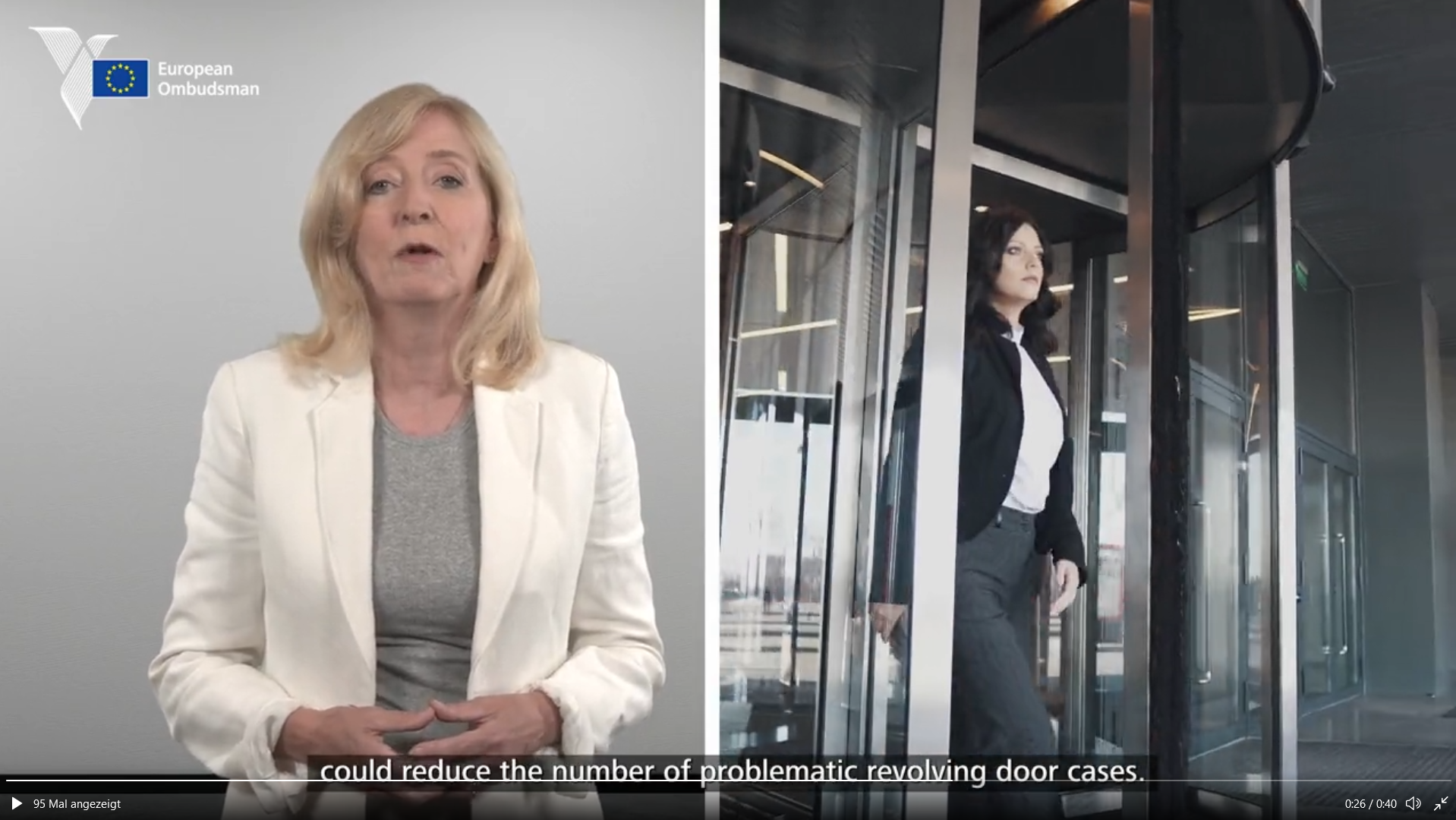EU Ombudsman: revolving door in Commission spins out of control
Today, the EU Ombudsman Emily O’Reilly published an analysis of 100 cases of former EU staffers taking new jobs – some of which for lobbying firms. The analysis looked into a number of revolving door cases potentially creating conflicts of interests where the application should have been rejected. “As this inquiry reveals, the Commission did so in only two out of the 100 cases inspected.” (point 38 in the decision).
The Ombudsman criticizes the Commission’s approach as too weak. The EU-Ombudsman recommends changing the approach by not granting permission for a new lobbying job “if restrictions cannot be effectively monitored or enforced”.
Daniel Freund, the European Parliament’s rapporteur on “strengthening transparency and integrity in the EU institutions by setting up an independent EU ethics body”, comments:
“The EU Ombudsman’s analysis proves: The protection against conflicts of interest in rapid changes of EU staff in lobby jobs is unacceptably weak. Independent oversight by an EU Ethics Body is necessary to stop revolving doors. An EU Ethics body would provide for an efficient framework to oversee Commission staff and therefore avoid conflicts of interest in revolving door cases. Parliament called the Commission to action for an EU Ethics Body by a large majority. Against the Commission’s current position, the Ethics body oversight must apply to former EU staff. The EU Ombudsman’s analysis shows this is necessary.
We have seen too many revolving door cases of EU chief diplomats changing to work for companies serving Chinese interests, EU competition lawyers changing sides at court from suing Apple to defending Apple. Too weak implementation of rules against revolving doors are a giant threat to the integrity of the EU. Internal knowledge of EU institutions must not be up for sale.”
——-
Cases of EU staff changing into problematic jobs
- 3 lawyers of DG Competition who defended EU anti-cartel rules against digital giants like Apple, then being allowed to work immediately for legal firms representing e.g. Apple against the Commission
- EU Commision head of unit Rainald Krüger who worked on regulating mobile phone companies taking leave, being allowed to lobby on behalf of Vodafone yet only if he does not contact former colleagues. Krüger was seen then at Vodafone lobby events with former colleagues which still did not trigger the Commission to revoke this permission.
- The former Head of Delegation in Washington, David O’Sullivan, left the External Action Service in February 2019 and got permission in June 2020 to work for Steptoe & Johnson LLP Brussels, a company that works for the Chinese firm Huawei.
- The former EU Ambassador Gerhard Sabathil left the External Action Service in August 2017 to become Managing Director at the lobby company EUTOP Berlin in September 2017. EUTOP is rather secretive who they work for.
Ombudsman’s press release of today: https://www.ombudsman.europa.eu/de/press-release/en/156070
“The inquiry covered a sample of 100 decisions taken by the Commission in 2019-2021, across 14 Directorates-General, all Commissioner cabinets, the Commission’s Legal Service, and the Secretariat-General. Of these 100 decisions, the Commission prohibited only two activities.”
Ombudsman’s decision of today: https://www.ombudsman.europa.eu/en/decision/en/155953
“Conclusion
The Commission should apply a more robust approach in relation to revolving door moves of its most senior staff to private sector jobs, shortly after departure or retirement, related to matters on which they worked while in the Commission.
Suggestions for improvement
Based on the findings in this strategic inquiry, the Ombudsman makes the following suggestions for improvement to the Commission:
- Where the Commission considers that a request to take up an activity poses risks that cannot be adequately mitigated by restrictions or when restrictions cannot be effectively monitored or enforced, it should (temporarily) forbid (former) staff members from taking up such positions or activities after their departure or when on leave on personal grounds.
- The Commission should explore the full range of measures available to it when approving an activity with mitigating measures. For instance, the Commission could make its approval of a new job conditional upon the (former) staff member obtaining a commitment from the new employer that the restrictions imposed by the Commission (for example the limits of what the (former) staff member can deal with) are made public in a prominent way, for example alongside the (former) staff member’s profile, on the new employer’s website. As a minimum, the Commission should require the (former) staff member to submit evidence that the restrictions imposed were shared with the new employer.
- The Commission should make public the information on post-service occupational activities of former senior staff members shortly after it adopts a decision to authorise such activities.
The Ombudsman invites the Commission to inform her, within six months from the date of this decision, of any action it has taken, or intends to take, in relation to the above suggestions.”
Ombudsman’s Tweet with video: https://twitter.com/EUombudsman/status/1526895127611965441
Parliament’s position of 16.09.2021: https://www.europarl.europa.eu/doceo/document/TA-9-2021-0396_EN.html
Commission’s reply of 18.02.2022 and letter of Commission to Council of 18.03.2022: https://www.politico.eu/wp-content/uploads/2022/04/06/VDL-letter-March.pdf
Greens/EFA legal studies and background papers: https://www.greens-efa.eu/en/campaigns/eu-ethics-body
The protection against conflicts of interest in rapid changes of EU staff in lobby jobs is unacceptably weak. Independent oversight by an EU Ethics Body is necessary to stop revolving doors.


